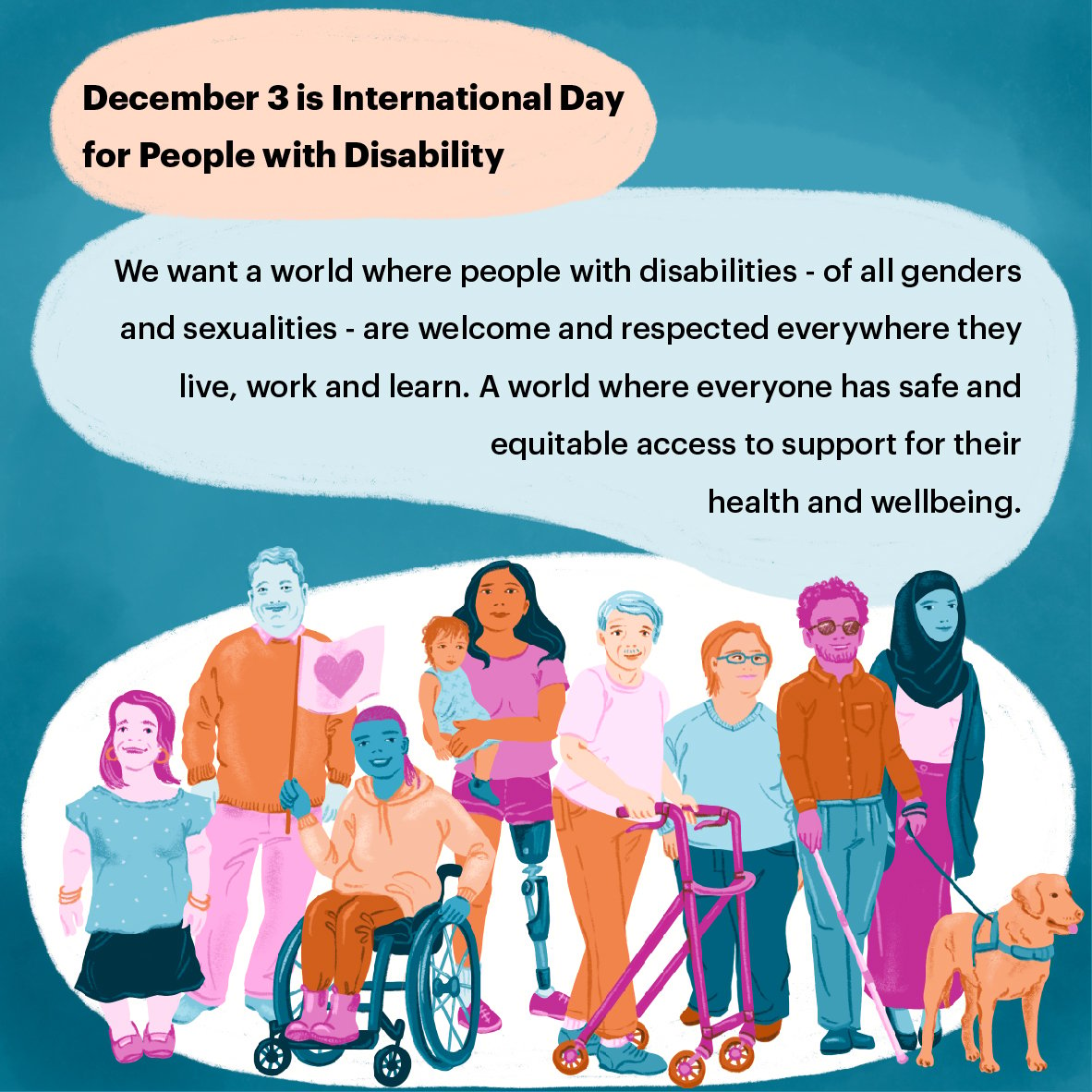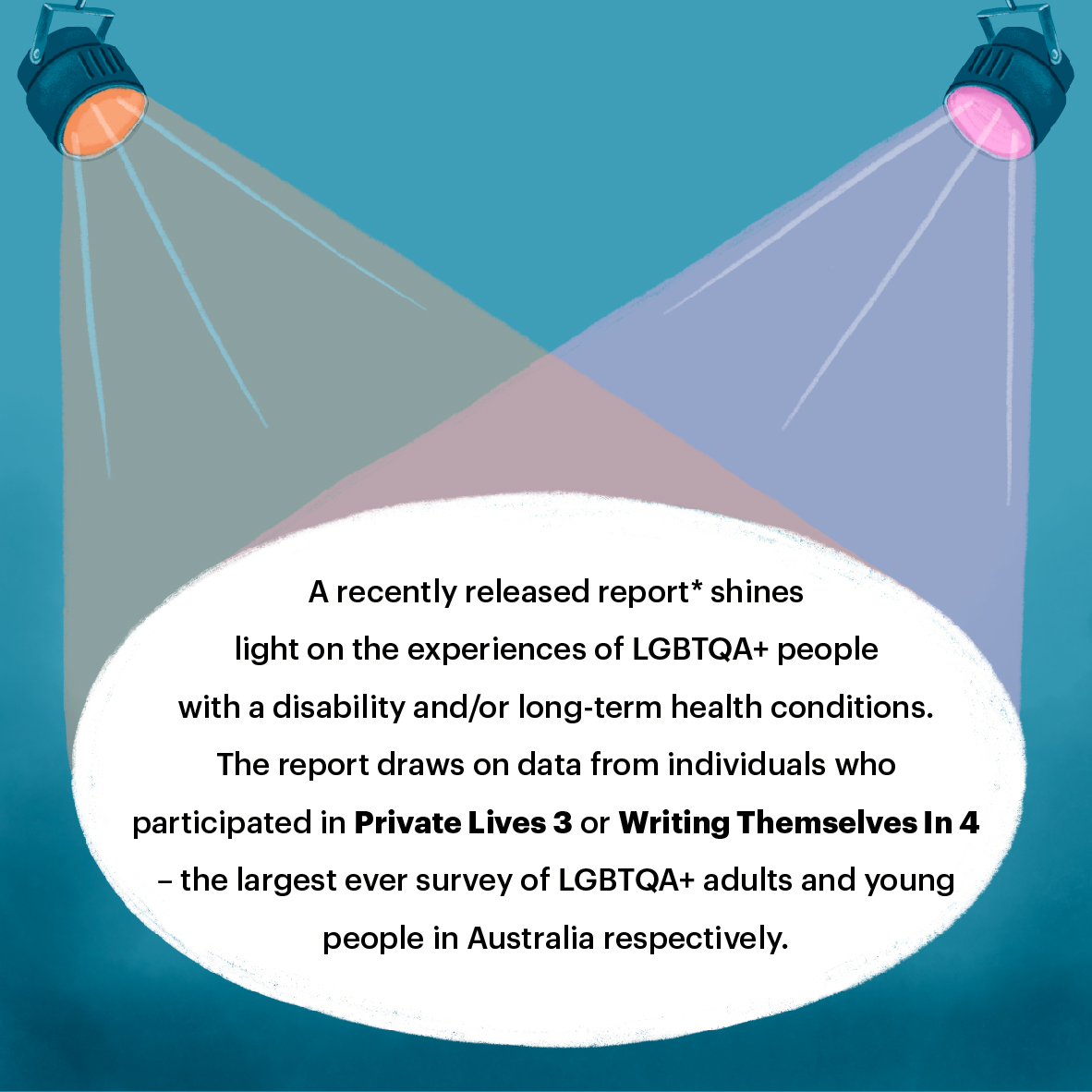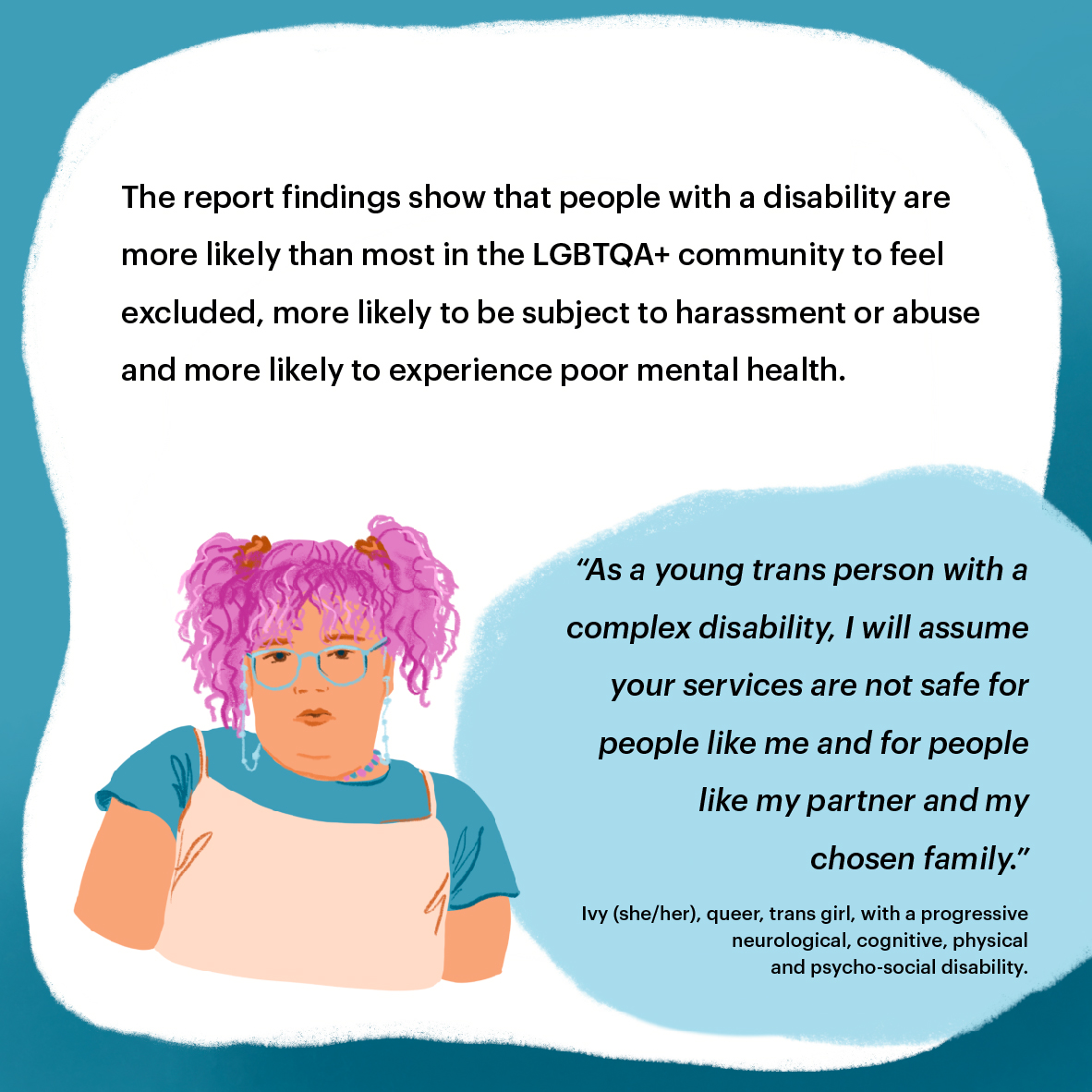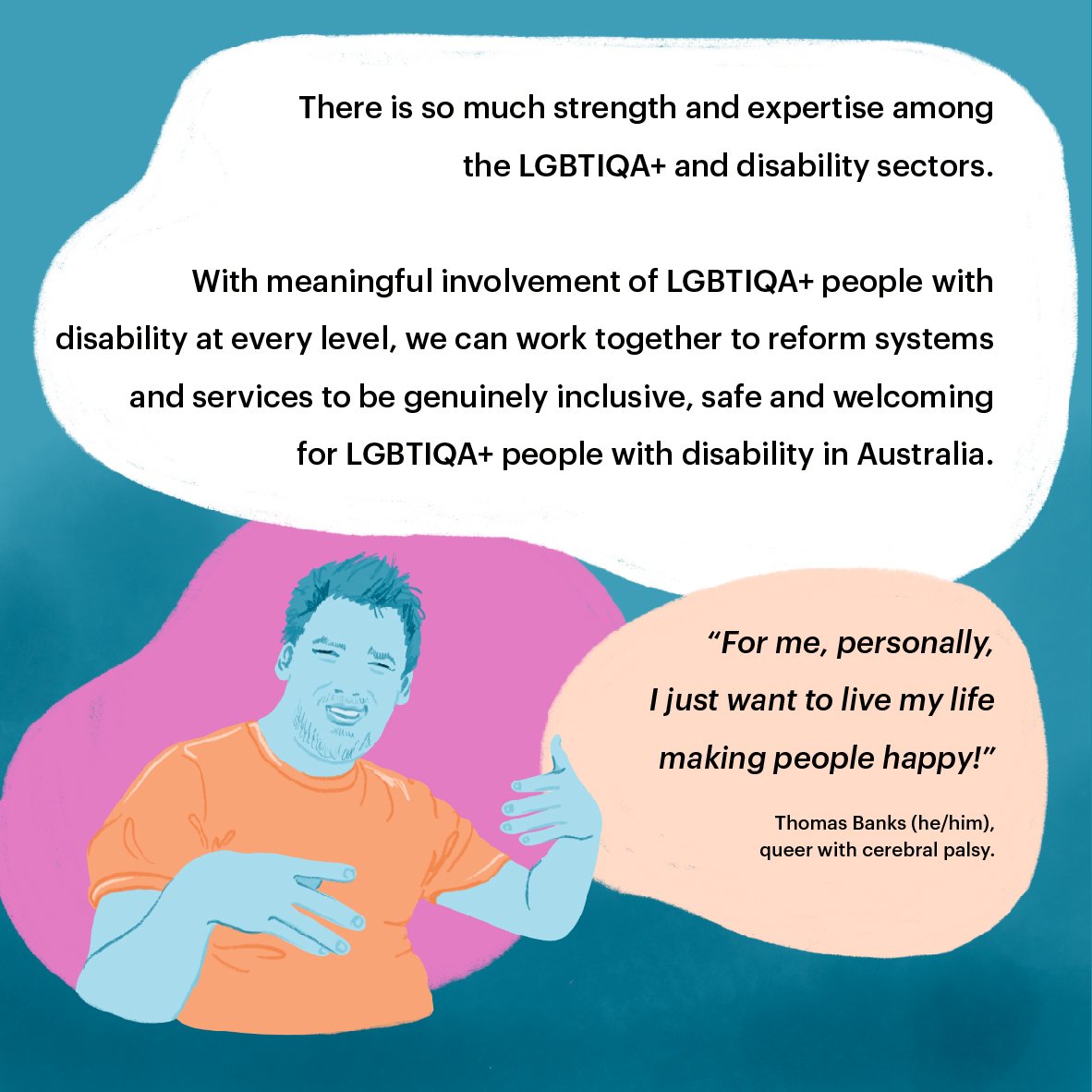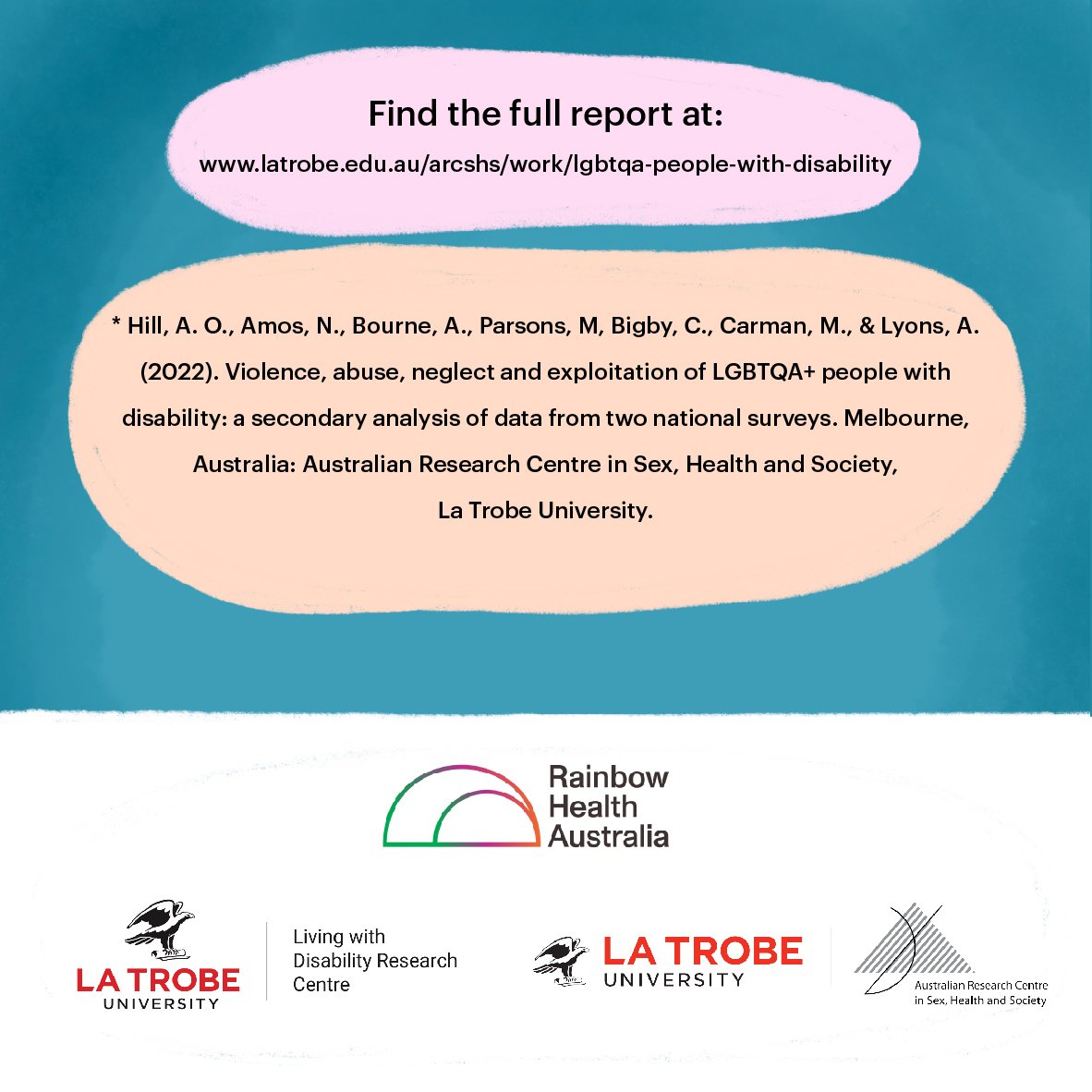LGBTQA+ people with disability
Violence, abuse, neglect and exploitation of LGBTQA+ people with disability: a secondary analysis of data from two national surveys
2022
Adam O Hill, Natalie Amos, Adam Bourne, Matthew Parsons, Christine Bigby, Marina Carman, Anthony Lyons
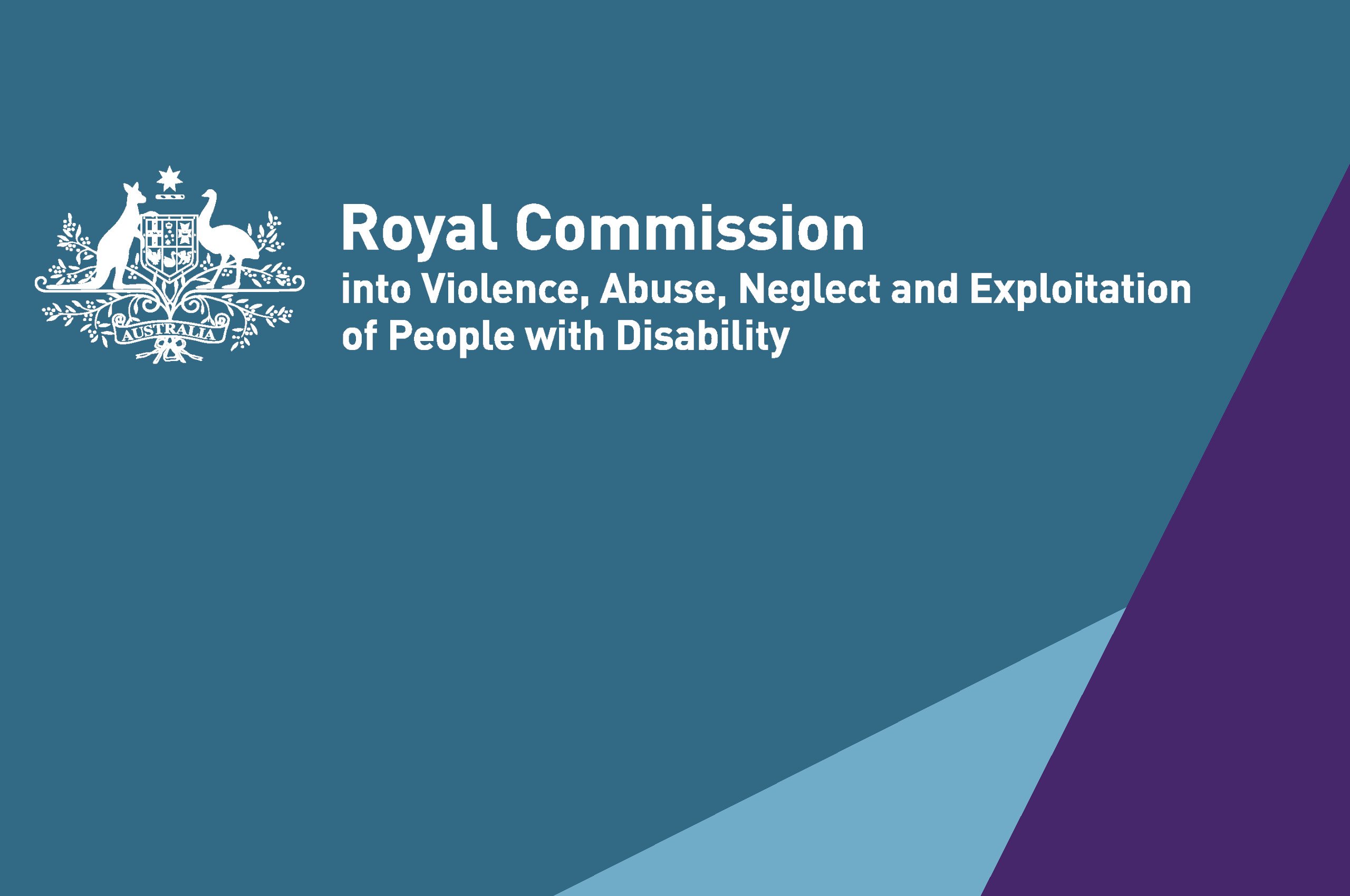 This report was compiled to inform the Royal Commission into Violence, Abuse, Neglect and Exploitation of People with Disability. It presents data on the experiences of lesbian, gay, bisexual, trans and gender diverse, queer and asexual (LGBTQA+) people with disability in Australia. These data are from two large national online surveys, Writing Themselves In 4 and Private Lives 3, which were conducted in 2019. Writing Themselves In 4 focused on young people aged 14-21 years and Private Lives 3 focused on adults aged 18 years and older.
This report was compiled to inform the Royal Commission into Violence, Abuse, Neglect and Exploitation of People with Disability. It presents data on the experiences of lesbian, gay, bisexual, trans and gender diverse, queer and asexual (LGBTQA+) people with disability in Australia. These data are from two large national online surveys, Writing Themselves In 4 and Private Lives 3, which were conducted in 2019. Writing Themselves In 4 focused on young people aged 14-21 years and Private Lives 3 focused on adults aged 18 years and older.
The report covers a wide range of experiences and issues of concern for LGBTQA+ people with disability. This includes: disclosure of their sexuality or gender identity to others, and the extent to which they feel accepted or supported when doing so; how safe they feel at work, in educational contexts and in LGBTQA+-specific spaces; their experiences of harassment, abuse and discrimination; family and intimate partner violence; their mental health or experiences of suicidal ideation or attempt; and how connected they feel to communities of people living with disability and/or those who are LGBTQA+.
In this report we closely attend to the principle of intersectionality. Living with disability is only one aspect of life and the experiences and needs of people with disability can also be shaped by a variety of other identities or characteristics that they may hold (for example, gender, sexual orientation, ethnic or cultural background, migration history, faith etc.). Intersectionality is a means of recognising how these can overlap or interconnect and, in some instances, contribute to complex forms of discrimination or disadvantage.
We anticipate the findings will be of use to all those working to support people with disability and for all organisations, policy makers and other stakeholders who work to ensure safe and affirming environments for both people with disability and those who are LGBTQA+.
National report
A large, accessible report that outlines all of the findings from this study can be downloaded below. It has been enabled for screen reading.
Download the PDF report
Research Report - Violence, abuse, neglect and exploitation of LGBTQA+ people with disability: a secondary analysis of data from two national surveys (PDF, 1.78MB, link will open in a new window)
Word document
Research Report - Violence, abuse, neglect and exploitation of LGBTQA+ people with disability: a secondary analysis of data from two national surveys (Word, 0.5MB, link will open a download window on your computer)
Easy read PDF with pictures:
Research Report - Violence, abuse, neglect and exploitation of LGBTQA+ people with disability: a secondary analysis of data from two national surveys (PDF, 2.57MB, link will open in a new window)
Easy read text-only Word document:
Research Report - Violence, abuse, neglect and exploitation of LGBTQA+ people with disability: a secondary analysis of data from two national surveys (Word, 0.05MB, link will open a download window on your computer)
Video summaries
These two videos provide a snapshot of the reflections by our projects' lived experience members about what the findings of this study really meant to them (4 minutes and 6 minutes, 53 seconds).
Social media tiles
Rainbow Health Australia have produced a set of shareable tiles which you can download and share, for International Day of People with Disability. To download, right-click and choose 'save as', or click to enlarge (image will open in new tab).
Lived experience videos
In order to make the findings and issues of concern as accessible and visible as possible, we have produced a series of short videos with members of the lived experience group that advised the research team. Links are below. All videos are subtitled.
Ivy’s story
An interview with Ivy McGowan (she/her), a white trans girl and queer young person living with a complicated progressive neurological cognitive, physical and psycho-social disability (7 minutes, 48 seconds)
Thomas’ story
An interview with Thomas Banks, a queer man with mild cerebral palsy (5 minutes, 8 seconds)
Margherita’s story
An interview with Margherita Coppolino (she/her), a short-statured lesbian with a dwarfism condition, hard of hearing, dyslexic, with anxiety and depression at times, aged 62 (but young at heart) and a first generation Sicilian Australian, who grew up in a Catholic orphanage as a ward of the state (10 minutes, 24 seconds).
Jarrad’s story
An interview with Jarad McLoughlin, a 37-year-old cisgendered gay man from South Australia with autism. (9 minutes, 37 seconds)
Partners and funding
This report was produced as a partnership between ARCSHS and the Living with Disability Research Centre at La Trobe University.
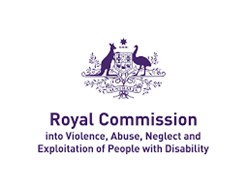 Funding for the report described above was kindly provided by the Royal Commission into Violence, Abuse, Neglect and Exploitation of People with Disability.
Funding for the report described above was kindly provided by the Royal Commission into Violence, Abuse, Neglect and Exploitation of People with Disability.
Funding for Private Lives 3 was originally provided by the Victorian Department of Health and the Victorian Department for Premier and Cabinet. Funding for Writing Themselves In 4 was originally funded by the Victorian Government Department of Premier and Cabinet, the Australian Capital Territory Government Office for LGBTIQ+ Affairs, the New South Wales Government Department of Health and Shine SA, with support from the Office of the Chief Psychiatrist in South Australia.
